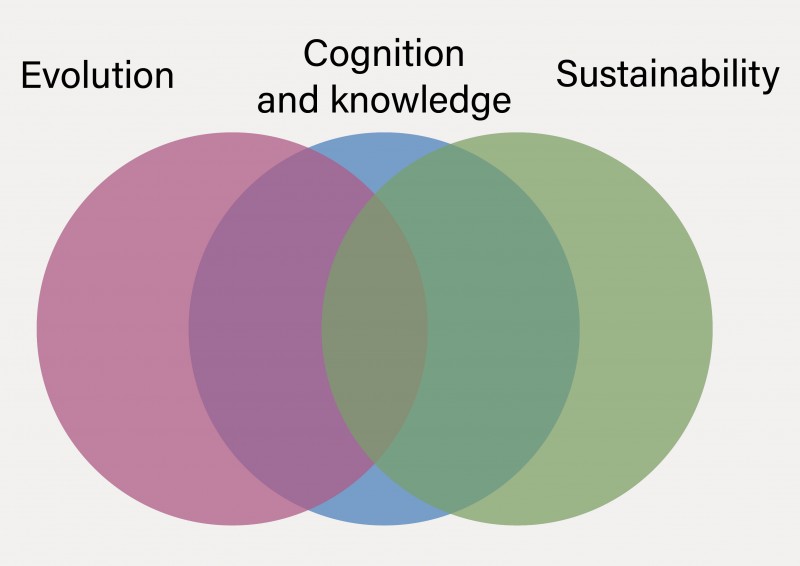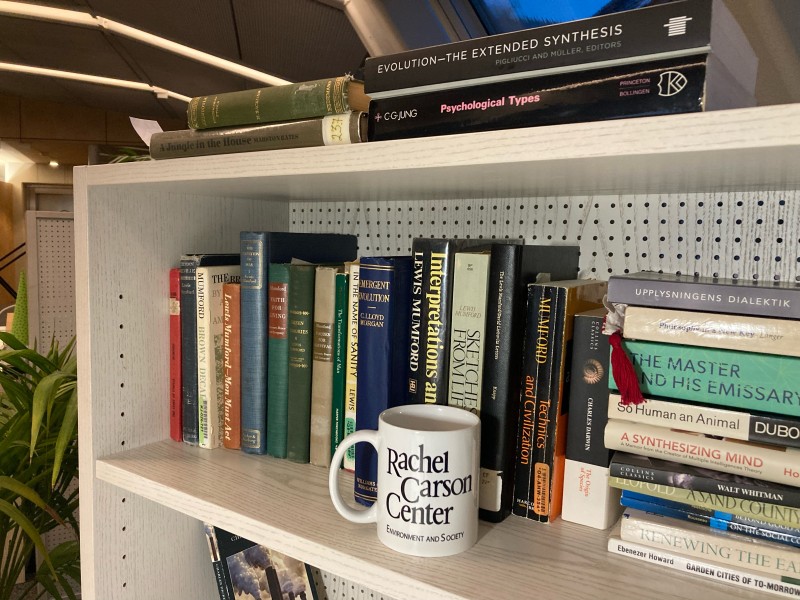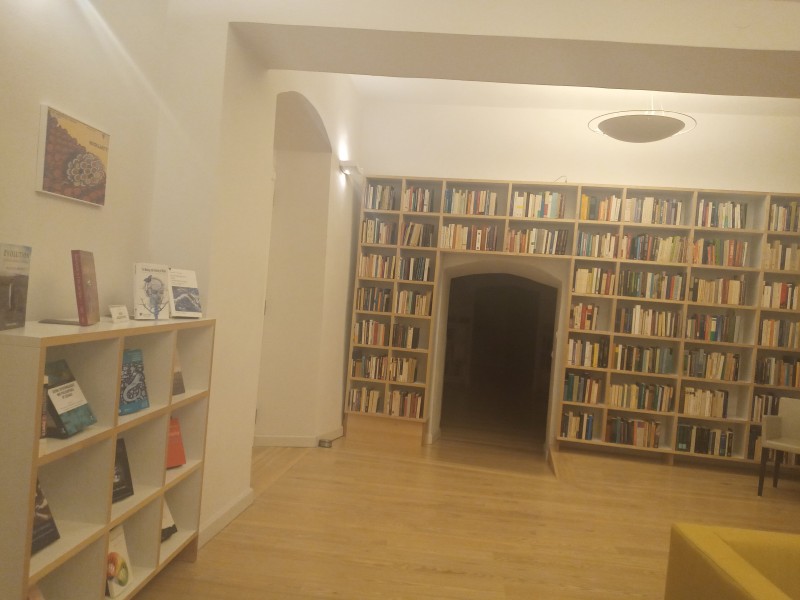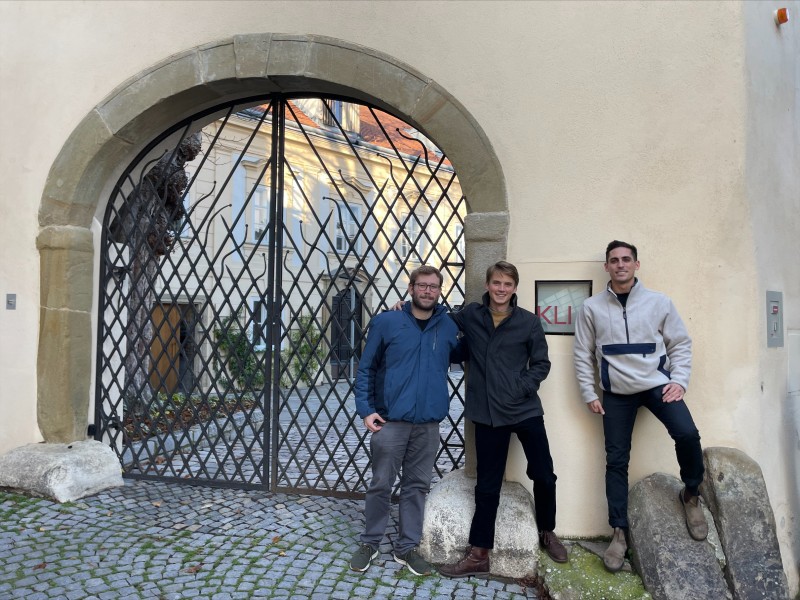News Details

The current cohort of dissertation writing-up fellows were selected from last year's fellowship call: “Cognition and Knowledge: Between Evolution and Sustainability." They were recruited for their unique and innovative approaches to interdisciplinarity in the three core KLI research domains. We invited Jonatan Palmblad, Alejandro Fábregas-Tejeda, Ilvanna Salas Leon, David Harrison, and Lauren Lambert to share how they transverse disciplinary boundaries. Continue reading or click the names above to directly jump to a specific response!
In the following "Venn diagram", where would you situate your work and
how do you navigate the intersecting disciplines?

I would have to place myself in the very middle, where all fields intersect. This is not to say that I am a biologist, a cognitive scientist, or a sustainability researcher—I am an environmental humanist. At least that will be the title of my doctorate. There is no exact agreement on what constitutes the environmental humanities but I see my dissertation as an opportunity to escape disciplinary confinement and to hone my skills as a “generalist.” We direly need specialists—I rely on their work for my own research—but the fragmentation of knowledge that ensues from specialization calls for generalism and synthesis too. At the KLI I am happily surrounded by people who know both how to analyze and to synthesize. As Samuel Butler (1835–1902) once wrote: “Woe to the specialist who is not a pretty fair generalist and woe to the generalist who is not also a bit of a specialist.”
My main interest, if I must pick one, is human–environment interaction. This topic is so broad that I think all disciplines can contribute to it, while none can explain it in isolation. This applies to the humanities as a field too. By making them “environmental,” then, they are pushed beyond their comfort zone as well as their traditional domain: they must transcend the “human” and consider the insights of other disciplines. This means to better understand the environment and ecology, but also to consider the aspects of the human that are often left out of humanistic inquiries, such as biology and cognition. If we want to know what it means to be human, we better not ignore our evolutionary origin and becoming, nor the cognitive structure of the brain with which we think. That is at least how my evolutionarily developed mind reasons.

Books of philosophy, psychology, history, science, and poetry that for one reason or another are cited in Jonatan’s dissertation. Most of the dissertation has been undertaken at his home institution, the Rachel Carson Center for Environment and Society, Munich, and together with the work at the KLI it is reaching an even higher level of interdisciplinarity than it already contained.
We cannot reduce humans to the facts of positive science, however, and this is why I think the humanities provide a necessary toolbox for discovering and determining what it means to be human. I use disciplines like philosophy, history, psychology, comparative literature, and my knowledge in classical languages to “make sense” of the facts of our species and the escalating ecological crisis. But the humanities, to the extent that they retain their connection to humanism, also have a normative dimension. While many focus on the problems of its anthropocentrism, I believe that humanism with its focus on humanity, if open-minded and interdisciplinary, can help us use science and technology in a sustainable way: if the human is understood as a relational and ecological being in an interdependent relationship with the environment and other species, not as a self-contained abstraction, human wellbeing and flourishing both can and must be pursued in a way that does not destroy the foundations of life. The KLI is a great environment for such a generalist approach: it is a ready-made niche, so to speak, and not much adaptation is needed from my side.
Alejandro Fábregas-Tejeda (Philosophy)
The problem addressed by my thesis cuts transversely across all the sets of the “Evolution”, “Cognition and Knowledge” and “Sustainability” Venn diagram, but my scholarly focus is mostly placed on the circle of “Evolution” (and other related biological disciplines) and its intersection with studies on cognition and scientific knowledge production.
My dissertation is focused on exploring how the organism-environment relationship has been construed within biology and on which notions it stands on. It is an interdisciplinary re-appraisal, both historiographic and philosophical, of one of the central pairings in the life sciences. Organisms and environments are said to be inextricably related, but what exactly is the nature of the bond that ties them together? Many theories, models and practices of different biological disciplines (e.g., ecology, eco-physiology, and developmental biology) start off with the assumption that organism and environment are two relata that can be unproblematically juxtaposed (e.g., apportioning causal contributions to one or the other in ecological or evolutionary scenarios, or securing the segregation of empirical variables to measure, intervene on, or keep constant in experimental settings). What epistemic advantages are afforded to scientists by thinking in this way, appealing to an abstract, but easily manageable dyad? And what are the potential drawbacks of framing living beings and their surroundings through this lens? In particular, I contend that three interrelated dimensions can help us shed light on these issues: (i) reciprocity, (ii) organismal agency, and (iii) organism-environment separation.
.jpeg)
A glimpse of Alejandro’s workplace at the Department of Philosophy I, Ruhr University Bochum. The picture summarizes what it is like to be part of the ROTO research group: collegiality, collaborative work, joy, and food (in this case, Alejandro and Guido I. Prieto are celebrating the publication of a joint paper with home-made Mexican ‘pan de muerto’). Alejandro feels the same spirit is also part of the KLI work environment.
Methodologically, I adopt an integrated history and philosophy of science approach for tackling this bundle of problems. The methods of this approach include traditional philosophical conceptual analyses, sound argumentation, archival research, historical contextualization, and reconstructions and reflections of scientific debates and concepts through the close reading of primary and secondary sources. I explore two periods of intensive debate on the organism-environment relationship: Interwar biology (especially the work encompassed in embryology, physiology, animal behavior and ecology under the so-called ‘Organicist Movement’) and contemporary discussions in multiple fields of the life and cognitive sciences (e.g., ecology, evolutionary biology, and ecological psychology). To overcome the limitations of combining insights coming from different (past and present) scientific disciplines, I seek to bring together a practice-sensitive philosophy of biology and a historiographic lens to appropriately reconstruct the contexts and motivations of past scientific endeavors and ideas.
Our framings of the organism-environment relationship affect research practices in the life, cognitive and sustainability sciences more generally, and canalize or constraint how we attempt to face environmental challenges and which theoretical possibilities are at reach. Ideas and conceptuall frameworks related to organism-environment reciprocity and agency are equally important in many applied areas (e.g., analysis of ecological networks, conservation efforts, prevention of zoonotic diseases) and can be informative outside the biosciences. Therefore, the expected output of my PhD project is targeted to historians and philosophers of science, as well as to practicing scientists of different orientations and sub-disciplines in the life, cognitive and sustainability sciences. Environmental historians and Anthropocene scholars could also find some convergent interests and novel insights on how the organism-environment relationship has been cast as it has within the life sciences.
My project title is “Relationship between genome architecture and social behaviors.” Given that the main goal of my work is to integrate an evolutionary event at a micro and macro scale, I would locate it in the purple “Evolution” circle, within the intersection of blue (“Cognition and Knowledge”) and green (“Sustainability”). Even though I deal with an evolutionary question, my work still occupies a big part of the blue section because the phenotype I am interested in is social behavior and it has everything to do with cognition and knowledge, which seem to be the basis of social behaviors, be it a cause or a consequence.
Less directly, the possible applicable goals of my research make it partially green because I try to understand some of the molecular basis of sociality. I ask: how much of the differences in social behaviors are explained by molecular evolution? Conversely, how much is molecular evolution influenced by social behaviors? I am convinced that this knowledge is key to understanding our own society. With that understanding, we might find better ways to interact and develop sustainable futures.
If I could locate my work in a physical location where I could nicely navigate the intersections between these disciplines, I would put it in the KLI, where I found a big and amazing door to dream with unconstrained ideas.

A picture of the KLI library. To me, it represents how I feel getting involved with knowledge from different disciplines. You see some information on the surface, but It’s a pathway that takes through a door that connects to new doors forward, and to me, it is very exciting. It also shows a bit of the magic of the KLI building.
In relation to these three domains, I believe I am best described as falling between Cognition and Knowledge and Evolution. My research focuses on the nature of cognition, agency, and information processing—specifically by adopting an evolutionary and biologically informed approach to these topics. I am specifically interested in the interrelations that exist between paradigmatically cognitive processes (such as goal-directedness, decision-making, learning, memory) and living processes (self-maintenance, self-organization, existential needs of survival and reproduction)—and my research explores the manner in which the latter are relevant for understanding the former.
To this end, I am positioned in so-called Basal Cognition research: a domain of theoretical and experimental biology that highlights the evolutionarily ancient nature of information processing; the deep homologies that exist between developmental and cognitive processes; and comparatively simpler organisms that lack the nervous systems commonly seen as required for cognitive sophistication. In highlighting these ‘basal’ features of cognition, the hope is that we may better understand the evolutionary origins of cognition as emerging with self-organizing, life-regulating processes found in humble unicellulars, through to the more elaborate body plans emerging in the Cambrian period, and ultimately covering the expanse of Darwin’s ‘forms endless and beautiful’ (Origin of Species).
Thus, given my interest both in the evolutionary basis of how mindedness evolved and the nature of current cognizers and how we conceptualise, study, or approach them—I feel ideally positioned at the intersection of the Evolution area and the Cognition and Knowledge area to address, in an interdisciplinary nature, the imbrication of living and cognitive processes. At the KLI, I hope to further explicate and expound upon these rich interrelations to better understand mind and its material substrate: both for questions of contemporary relevance, and for potentially exploring how minds can be recreated in digital or robotic environments.

Fellows Alejandro and David invite friend and colleague Auguste Nahas (University of Toronto) for an informal stay at the KLI.
Lauren Lambert (Sustainability)
I would situate my work squarely between the three, perhaps with a strong lean toward sustainability and practice. Effective collaboration (cognition & knowledge) and cooperation (evolution) are at the heart of present and future sustainability (sustainability) challenges and solutions. Collaboration among social groups (intragenerational), across time (intergenerational), and across species (interspecies) is each central to achieving sustainability transitions in the 21st century.

A photo of me in my happy place: multi-colored highlighters keep art close to my process, the plant gives me non-human company, the standing position keeps me in the physical experience of having a body while I work, my wool gloves give me a cozy feeling of comfort, and the snow brings the mood of Vienna into perspective holding the container for my experience at KLI.
From my research perspective, humans have the superpower to collaborate at large scales and over long periods of time, but also the vulnerability of cognitive biases (cognition and knowledge), which undermines collaborative capacity (evolution) toward sustainability (sustainability) outcomes. Thus, any interventions seeking to advance sustainability outcomes requires countering cognitive biases and facilitating across fundamentally different dispositions of intragenerational, intergenerational and interspecies collaboration challenges. Anticipatory interventions offer one approach to collaboration across groups for the future, while deliberative democratic interventions offer another approach to collaboration across groups in the present. However, too often, these efforts at collaboration under-theorize the social dynamics at play and assert that deliberating more or anticipating more will solve sustainability challenges.
In my research, I draw on theories of empathy to empirically explore effective techniques for supporting inter and intra generational collaboration to answer the question: What can make sustainability interventions more effective at bypassing cognitive bias (cognition & knowledge) and increasing coherence (evolution) across social groups, the future and different species (sustainability)? At the KLI, I am working to step from the particularities of the individual cases in my research into the broader question of a theory of empathy in human-nature relations and the role of empathy – and interventions to enhance empathic feeling and cognition – to advance sustainability.

